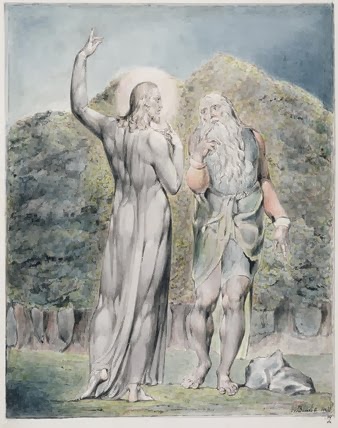2nd February Trinity
Luke 8:14-18
 And as a great crowd had gathered, and ever more people streamed to him
out of the cities, he spoke in a parable:
And as a great crowd had gathered, and ever more people streamed to him
out of the cities, he spoke in a parable:
A sower went out to sow his seed. As he sowed, some seed fell on the
path. It was trodden upon, and the birds of the sky (air) ate it up. Other seed
fell upon the rocks, and as it sprouted, it (the sprouting green) withered,
because it had no moisture. Still other seed fell under the thorns; the thorns
grew with it and choked what came up. And some fell upon good soil, grew, and
brought forth fruit a hundredfold. When he had said these things, he called
out:
“He who has ears to hear, let him hear!”
His disciples
asked him what this parable might mean. And he said:
To you it has been given the gift of being able to understand the
mysteries of the kingdom
of God
The seed is the Word of God. That which fell upon the path are those who
hear it; afterwards the tempter comes and tears the Word out of their hearts,
so that they cannot find healing through the trusting power of faith working in
them.
Those on the rock are those who, when they hear the Word, take it up
with joy; but they remain without root. For a while the power of their faith
works in them, but in times of trial they fall away.
 What fell under the thorns are those who hear the Word from the spirit,
and as they go on their way, the sorrows and the riches and the joys of life
choke it, and they bring no fruit to maturity.
What fell under the thorns are those who hear the Word from the spirit,
and as they go on their way, the sorrows and the riches and the joys of life
choke it, and they bring no fruit to maturity.
And the seed which fell in the good soil are those who hear the Word,
and take it up into their hearts, feel its beauty, become noble and worthy and
patiently keep it alive, tending it there until it brings forth fruit.
No one lights a light and hides it under a vessel or under a bench;
instead he places it on a lamp stand so that all who come in see the light. For
nothing is hidden which shall not be revealed, and nothing is secret which
shall not be known and proclaimed.
So attend to how you listen. For he who has enlivened in himself the
power to bear the spirit, to him more will be given. He however who does not
have this power, from him will be taken that which he thinks he has.
2nd
February Trinity
Feb
11, 2007
Luke
8:14-18
Imagine
a potted plant you could only view from a distance. How could you tell if it
were a living plant or an artificial one? You could observe it over time. Does
it grow and blossom? Does it change?
The
Gospel says that Jesus uses agricultural images especially for the souls who
stream to him from the city. These plant images are the most accurate for
describing how the living seed of the Word of God changes and grows over time.
So He uses images from the realm of living processes to describe how the Word
of God lives and grows in the soul.
The
life realm is a quiet realm. We don’t hear flowers open to a fanfare of trumpets.
We don’t perceive a great symphonic flourish when fruit ripens. The living Word
of God is as quiet as a seed. The very loudness of modern life with its sorrows
and riches and joys may distract us to the point where our souls can no longer
provide the depth and richness, the fertility for the germination and growth of
His Word.
We need to tend the field of our own souls. We need
to till the ground of the
heart, perhaps through suffering, certainly through
attention and selfless deeds. We need to water the ground of the heart with our
tears, warm it with our prayers, let shine the clear sunlight of our spiritual
learning and understanding. We need to take in the seed of God’s Word and
treasure it in our hearts. We need to protect it and nourish it in the womb of
the soul so that it grows and develops there.
 |
| Alfred Soord |
We
can grow God in our hearts. We do this so that His Word can mature and ripen
into fruitfulness that we can offer to the world of earth and the world of the
angels. God’s Word – as it quietly speaks in the Gospels, as it is imaged in
nature, as it speaks through human destinies -- resounds and manifests in the
world through us. We can grow and carry God wherever we go. We can be
the place where His Word becomes manifest, grows and transforms.












